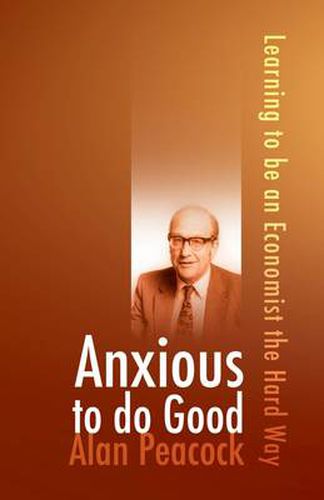Readings Newsletter
Become a Readings Member to make your shopping experience even easier.
Sign in or sign up for free!
You’re not far away from qualifying for FREE standard shipping within Australia
You’ve qualified for FREE standard shipping within Australia
The cart is loading…






‘After nearly three and a half - rather too exciting - years as a young war-time sailor, Alan Peacock expected to return to a life of quiet contemplation. Instead he became an activist economist frequently engaged in controversies about the conduct of economic policy lasting all his professional life. His earlier experiences at trying to do good’ will resonate with all those who have attempted to influence political action, but the account is also designed to inform and entertain those who are curious to know whether economists are actually human. The author has lived long enough to have become a Fellow of both the British Academy and Royal Society of Edinburgh and was knighted for public service in 1987. Alan Peacock’s professional life as an economist has been devoted to exploring the contribution that markets can make to the good society of his own and liberal aspiration - one which improves the life chances of the poor while preserving personal liberty. His big idea was to subsidise people, not goods and services. This has the double benefit of enlarging personal choice and reducing the role of government. The resistance of the Liberal Party to the proposal for personal vouchers’ caused Professor Peacock to sever his connection with that Party in 1970. His cautionary tale of rejected advice, interspersed rueful reflections and engaging anecdotes, is essential reading for anyone who sets out to do good’ by being a policy adviser to politicians’ - Robert Skidelsky. ‘Alan Peacock’s is a fascinating practical, as well as intellectual memoir. He has sought all his life to explain how liberalism and welfare can march hand-in-hand without excessive state propulsion. His study reminds us just how difficult it was for social market ideas to get a hearing in the UK for the first quarter-of-a-century after World War II’ - Peter Hennessy, Queen Mary, University of London. ‘There is much to savour in this book, reminding us as it does that economics is much more than arid modelling. But as a York undergraduate in the 1960s my favourite relates to the development of the Peacock-Wiseman voucher scheme for education - a brilliant idea whose time may at last have come’ - Ruth Lea, Economic Adviser, Arbuthnot Banking Group.
$9.00 standard shipping within Australia
FREE standard shipping within Australia for orders over $100.00
Express & International shipping calculated at checkout
‘After nearly three and a half - rather too exciting - years as a young war-time sailor, Alan Peacock expected to return to a life of quiet contemplation. Instead he became an activist economist frequently engaged in controversies about the conduct of economic policy lasting all his professional life. His earlier experiences at trying to do good’ will resonate with all those who have attempted to influence political action, but the account is also designed to inform and entertain those who are curious to know whether economists are actually human. The author has lived long enough to have become a Fellow of both the British Academy and Royal Society of Edinburgh and was knighted for public service in 1987. Alan Peacock’s professional life as an economist has been devoted to exploring the contribution that markets can make to the good society of his own and liberal aspiration - one which improves the life chances of the poor while preserving personal liberty. His big idea was to subsidise people, not goods and services. This has the double benefit of enlarging personal choice and reducing the role of government. The resistance of the Liberal Party to the proposal for personal vouchers’ caused Professor Peacock to sever his connection with that Party in 1970. His cautionary tale of rejected advice, interspersed rueful reflections and engaging anecdotes, is essential reading for anyone who sets out to do good’ by being a policy adviser to politicians’ - Robert Skidelsky. ‘Alan Peacock’s is a fascinating practical, as well as intellectual memoir. He has sought all his life to explain how liberalism and welfare can march hand-in-hand without excessive state propulsion. His study reminds us just how difficult it was for social market ideas to get a hearing in the UK for the first quarter-of-a-century after World War II’ - Peter Hennessy, Queen Mary, University of London. ‘There is much to savour in this book, reminding us as it does that economics is much more than arid modelling. But as a York undergraduate in the 1960s my favourite relates to the development of the Peacock-Wiseman voucher scheme for education - a brilliant idea whose time may at last have come’ - Ruth Lea, Economic Adviser, Arbuthnot Banking Group.